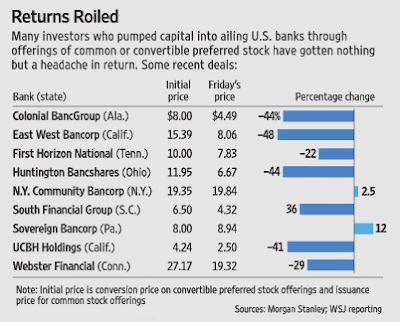I saw this piece from the WSJ this morning and I had to chuckle. It was simply a matter of time before the so called "smart money" got tired of catching falling knives, and investing in banks that are up to their necks in bad loans.
Take a look below at the losses the smart money has taken after buying offerings that were at "discount" prices at the time of purchase.

Whoa! Talk about catching a falling knife. Many of these investments were several billion dollars. Imagine buying one of these stocks at a discount only to find yourself 44% in the hole a few months later.
Here are some highlights from the article:
"Once bitten, twice shy.
As banks rack up billions of dollars in losses from bad loans and blundered investments, large investors are becoming skittish about pumping more money into them.
In the past several weeks, bank executives have encountered unexpected resistance from investors, who have expressed reluctance to participate in the capital-raising transactions sweeping through the industry, according to people familiar with the situation. Already bruised by big losses and fearing that bank shares haven't yet hit bottom, some of these investors are choosing to tighten their purse strings.
"The window for capital-raising is closing," says Brad Evans, a portfolio manager for Heartland Advisors Inc., a money-management firm in Milwaukee that invests in small, regional banks. "Investing in a bank right now means investing in a large portfolio of loans that are essentially a black box."
"Investors are tired of trying to catch a falling knife," says one investment banker who specializes in the financial-services industry.
Growing queasiness could force some banks to downsize their capital-raising ambitions. That is how some analysts and investors interpreted the actions of Fifth Third Bancorp, which on Tuesday said it would raise $1 billion through an offering of convertible preferred stock and sell $1 billion in assets. The Cincinnati bank also cut its dividend for the first time in three decades.
"The decision we made speaks for itself," a Fifth Third spokesman said."
Final take:
I am not surprised that investors are running for the hills after the ass whooping they have repeatedly taken from these banks over the last few months. This does not bode well for the banks going forward.
This will especially hurt the smaller regional banks. They are slowly running out of options. The next step for these banks will be to eliminate their dividends. If this isn't sufficient then you could start seeing these financial institutions begin to fold like tents.
Anyone thinking of dipping their toes into the water and buying financials this week after the drop last week should not pull the trigger just yet IMO. If the capital raising comes to a standstill, there will be another shoe to drop and that shoe could be insolvency.
3 comments:
I keep pondering Paulson's & Bernanke's March utterances on how global markets would have panicked had the Feds not bailed out Bear Stearns’ creditors, particularly the CDOs. Yes, I know their insurance guarantee situation differs from that of the FDIC. Still, why are we so comfortable in our belief that the average financially un-savvy American depositor will read story after story of deteriorating banks as summer progresses and yet exhibit more self-control and calm in the face of it than that of professional traders and savvy investors? I think Bernanke and Paulson have a better grip on group 'tipping points' than many of us in blogdom. True, depositors don’t ponder that even though the Act empowers Treasury to go to the capital markets to raise up to $30 billion for a depleted FDIC insurance fund, such global markets would be wildly dysfunctional at the time of bank failures large enough to have depleted the insurance funds.
Even without knowing such fine print, I think the public is likelier to panic than we admit. So, did Bernanke/Paulson tip us of their own astuteness when they publicly admitted professionals are likely to panic? I'll post this in the forum along with part II.
Part II.
Still problematic about FDICIA is the timeliness of access to your money at a new account at another institution once your bank has failed. Have any of the reforms of the last 20+ years stated the maximum time FDIC has to complete their work and provide you access? Query an FDIC official and see how they respond on the timing question (they'll just recite how timely they were in the past).
Up until 2005, this was a silly question. FDICIA's ability to act timely amidst a multi-state rash of near simultaneous failures is questionable. I think it's more likely they will drastically delay declaring additional failed banks as failed banks once the volume of work becomes untenable, no matter how many more inadequately capitalized banks are quietly discovered by Examiners. This tactic would buy them the time they need to get caught up. Once this is discovered, it will be fodder for blogdom...but it could be years before the FDIC fesses up.
avl
Whats very strange today is how violent the dump of the financials has been today in a flat market.
SKF(ulta short financials) has had a bigger move up today than any of the big down days last week.
Strange price action. You have to wonder if something is up like a bank being in trouble.
Maybe fear of a systemic breakdown?
Strange the way they are trading today.
Post a Comment